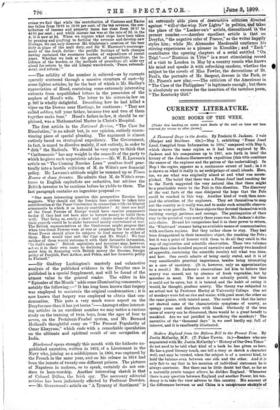CURRENT LITERAT URE.
SOME BOOKS OF THE WEEK.
[Under this heading,we notice such Books of the week as hav e.not been reserved for review in other forms.]
A Thousand Days in the Arctic. By Frederic G. Jackson. 2 vols (Harper and Brothers. 32s.)—Map 1, exhibiting "Frani Josef Land; Compiled from Information to 1894," compared with Map 5, which 'shows • the Mme region as it had been explored by Mr. Jackson and his companions up to 1897, sets forth in brief' the history of the Jackson-Harmsworth expedition (this title combines the names of the explorer and the patron of the undertaking). In Map 1 the region .appears as a continuous extent of land ; in 5 it is shoWn as irliseit really is, an archipelago of small islands.: Here, too, we _see what was originally aimed at and what PM accom- plished. The belief that there was a Franz Josef land reaching far to the North suggested the very natural idea that there. might be a practicable route to the Pole in this direction. The discovery of the' real facts, of the case didsipated the hope that 'the Pole could be reached in 'this way. Another kind of work then occu- pied the attention of the explorers. They set thernselves to map out the country as it really was, and to make such scientific observa- tions as were possible. To these objects they deVOted theinselies-with untiring energy, patience, and courage. The prolongation of their stay to the period of verynearly three years was Mr. Jackson's delibe- rate choice. He and his companions had it in their power to return, the Windward' steamer being an available means of -communication with southern regions. But they rather chose to stay. They had been disappointed in their immediate object, the reaching the Pole ; but it was a point of honour with them to, do all they could in the way of exploration and scientific observation. These two volumes (more than nine hundred pages of narrative and nearly two hundred of appendix, containing the scientific results) tell what was done, and how. One result admits of being easily stated, and it is 'of very considerable practical importance, besides being interesting as a case of casuistry. (It is, however, only an approximation to a result.) Mr. Jackson's observations led him- to believe that scurvy was caused, not by absence of fresh' vegetables, but by microbes in meat. The meat is not actually putrid, for then it could not be eaten, but it is tainted, and the habit of eating it would; he thought, ioduce. scurvy. The theory was subjected to an actual test by Professor Harley at University College. One set
of monkeys were fed on rice and maize, with meat, the other on the same grains, with tainted meat. The result was that the latter set showed some of the characteristic symptoms of scurvy, as spongy gums and' diarrheea with blood: Obviously if the true cause of scurvy can be discovered, there would be a great benefit to mankind. Are we not juitified in sacrificing the monkeys ? 'The narrative of - the " thousand days " is, we need hardly say, full of interest, and it is excellently illustrated.






































 Previous page
Previous page